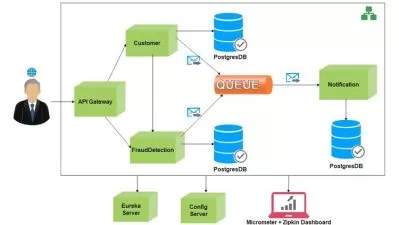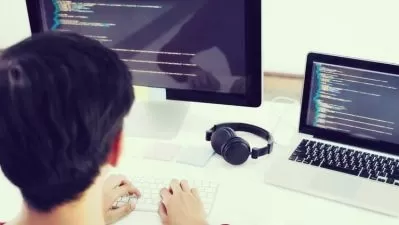Architecting Python Microservices in AWS with ECS & App Mesh
Adam McQuistan
5:46:06
Description
Learn to build and deploy Python microservices in AWS with FastAPI, CDK, Fargate/ECS, App Mesh, Cognito, CodePipeline
What You'll Learn?
- Cloud Microservices Architecture
- AWS Cloud Development Kit (CDK)
- Fargate Serverless Container Compute Engine
- Elastic Container Registry (ECR)
- Elastic Container Service (ECS)
- App Mesh
- FastAPI Python Framework
- AWS Distro for Open Telemetry in Python
- AWS CodePipeline
- Domain Driven Design
- Amazon Cognito
Who is this for?
More details
DescriptionIn this course learners will be taken on a journey to learn the fundamental principles of what a microservice architecture is and how to build, deploy and operate Python based microservices in the AWSÂ Cloud. This course provides a balance of theory covering key aspects of each major technology or cloud architecture component followed by practical code demonstrations deployed as working examples in the AWSÂ Cloud.
The technologies covered, along with a brief summary of why they have been selected, are listed below.
Python was selected as the language due to its ease of use, succinct readability, and high popularity among software engineers today
AWSÂ Elastic Container Service (ECS) was selected as a Container Orchestration technology because of its simple abstractions, especially when ran on Fargate, for managing containers yet remain scalable and robust enough for enterprise workloads
App Mesh was selected because its a robust service mesh based on the open source Envoy Proxy for enhanced microservice networking delivered as a fully manged implementation by AWS alleviating the need to provision and maintain a service mesh control plane
AWSÂ Cloud Development Kit was selected because of its modern approach to Infrastructure as Code with intuitive object oriented library design and availability in Python alleviating the burden of context switching between app code and deploy code languages
Code Pipeline was selected as a Continuous Delivery orchestrator pipeline due to its nearly hands free administration qualities along with tight integration with AWS Cloud Development Kit and GitHub
GitHub is used for version control and Continuous Integration capabilities with CodePipeline
Amazon Cognito for securing FastAPI microservices with OAuth and SaaS based user management
Who this course is for:
- This course is intended for Software Engineers who wish to learn how to design, build, deploy and operate Python microservices in the AWS Cloud
In this course learners will be taken on a journey to learn the fundamental principles of what a microservice architecture is and how to build, deploy and operate Python based microservices in the AWSÂ Cloud. This course provides a balance of theory covering key aspects of each major technology or cloud architecture component followed by practical code demonstrations deployed as working examples in the AWSÂ Cloud.
The technologies covered, along with a brief summary of why they have been selected, are listed below.
Python was selected as the language due to its ease of use, succinct readability, and high popularity among software engineers today
AWSÂ Elastic Container Service (ECS) was selected as a Container Orchestration technology because of its simple abstractions, especially when ran on Fargate, for managing containers yet remain scalable and robust enough for enterprise workloads
App Mesh was selected because its a robust service mesh based on the open source Envoy Proxy for enhanced microservice networking delivered as a fully manged implementation by AWS alleviating the need to provision and maintain a service mesh control plane
AWSÂ Cloud Development Kit was selected because of its modern approach to Infrastructure as Code with intuitive object oriented library design and availability in Python alleviating the burden of context switching between app code and deploy code languages
Code Pipeline was selected as a Continuous Delivery orchestrator pipeline due to its nearly hands free administration qualities along with tight integration with AWS Cloud Development Kit and GitHub
GitHub is used for version control and Continuous Integration capabilities with CodePipeline
Amazon Cognito for securing FastAPI microservices with OAuth and SaaS based user management
Who this course is for:
- This course is intended for Software Engineers who wish to learn how to design, build, deploy and operate Python microservices in the AWS Cloud
User Reviews
Rating
Adam McQuistan
Instructor's Courses
Udemy
View courses Udemy- language english
- Training sessions 68
- duration 5:46:06
- Release Date 2022/12/18
















